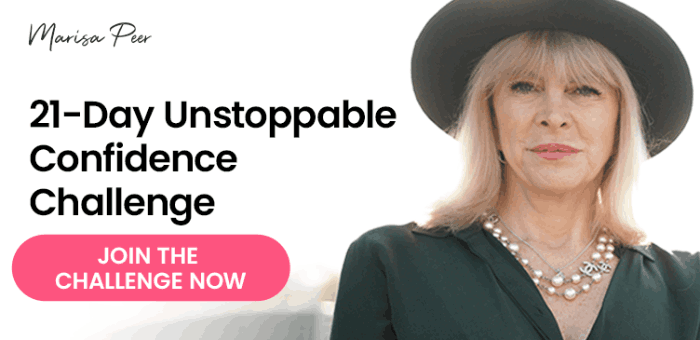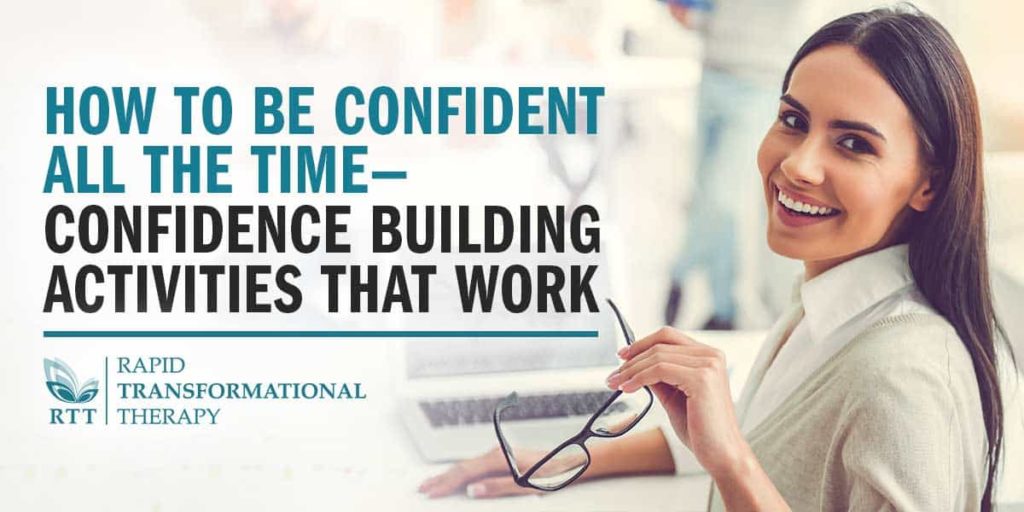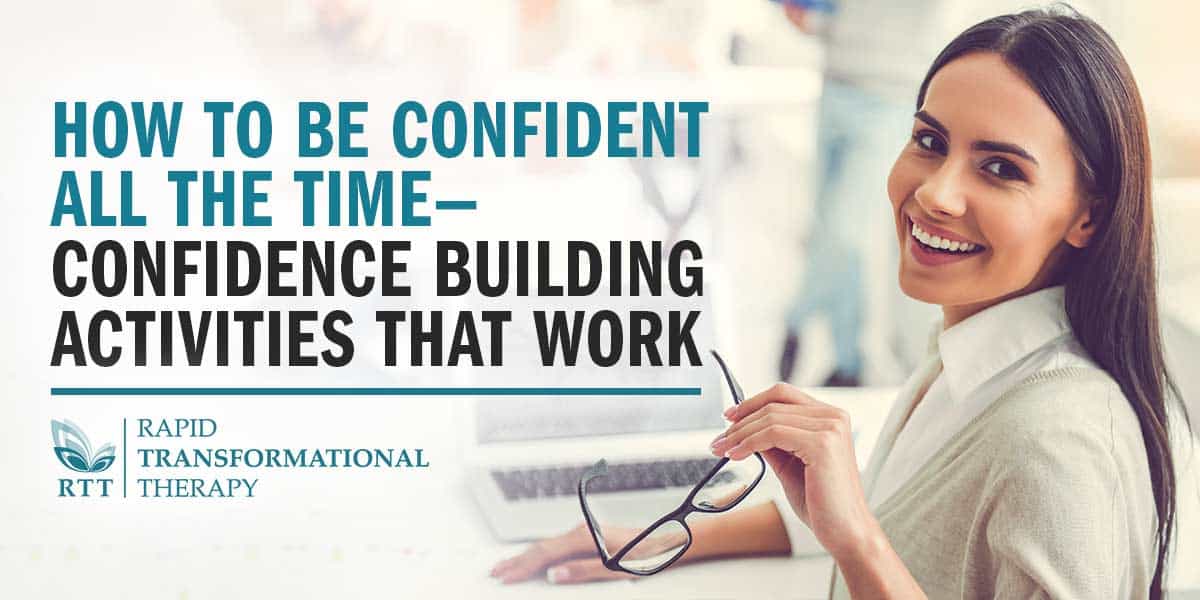Confidence is a fickle beast.
When you have it, you feel you can do anything.
The right words come to you with ease, you can brighten people’s day simply with a smile, and you can do no wrong even if you tried.
When it escapes you, however, you turn into a tongue-tied, socially inept “nobody” that’s not capable of holding a simple conversation about the weather without stammering.
Your confidence usually takes the biggest hit when you are faced with a difficult time. A rough break-up or a job loss can calls into question your sense of worth.
The good news is that everyone experiences bouts of low confidence from time to time.
Even the most confident, charismatic people you can think of sometimes feel like they are simply not enough.
So, how do you escape the crazy rollercoaster ride that comes with the capricious nature of your own self-belief?
How do you build a confidence that is immune to every day’s ups and downs?
How do you increase your confidence every day and empower yourself to take the bold risks that are needed for your own growth?
This is where these simple confidence building activities we have for you can help.
Once you understand how your mind works, you can use it to build a rock-solid, reliable foundation of self-esteem you can trust in—no matter what obstacles life throws your way.
Here is what we will cover:
- What confidence actually is and what it looks like
- Why you need to improve your confidence if you want to succeed in life
- How to unlock your true power with five actionable confidence building activities that you can start applying today
What Confidence Actually Is? (And What It Looks Like)

Self-confidence is your opinion about your own skills and abilities.
A high level of confidence allows you to accept and trust yourself unconditionally.
Self-confidence means having a positive view of yourself. It allows you to set realistic expectations, goals, communicate assertively, and handle criticism without feeling like you are being attacked on a personal level.
For example, if you have a high level of self-confidence in your abilities, you are more likely to do what you believe is right even if others mock or criticize you for it.
It puts you on a positive self-reinforcing spiral. You feel unstoppable—the more you do, the more you achieve; and the more you achieve, the more you believe in yourself.
It also gives you a sense of control in your life. It helps you get out of your comfort zone when you are feeling complacent.
On the other hand, low self-confidence makes you second-guess yourself, be submissive to people, and have difficulty trusting others.
You may feel inferior, unloved, and be overly sensitive to criticism.
For example, having a lack of self-confidence makes you more likely to stay in your comfort zone and avoid risk. This passive attitude puts you in a negative self-reinforcing spiral. You feel disempowered—the less you do, the less you achieve; and in turn, the less you believe in yourself.
Improve Your Confidence To Succeed In Your Career And Life

Confidence is essential to your success in your career and life in general.
Numbers don’t lie.
According to research, one in five people have failed to secure a new job because of their lack of self-confidence.
On the other hand, confident employees have 22% more sales than their less confident peers.
Confidence, however, is not confined to your work life; it also makes a huge difference in your relationships.
Notice how you most likely tend to gravitate toward people who have an aura of charisma around them?
We are attracted to people who are expressive and authentically present themselves. It is because they exude confidence, which makes us feel safe and secure.
The certainty they have in their actions helps us put trust in them because they seem like they know what they are doing.
In other words, a high level of self-confidence translates into more opportunities to connect with people romantically and professionally, and an ability to create deep, life-long friendships.
Unleash Your Inner Power With These Confidence Building Activities For Teens & Adults

So the million dollar question is: How can I be more confident?
Confidence is like a muscle—with the right set of exercises you can build it up.
Marisa Peer, world-renowned therapist, says:
“Every word you say and thought you think becomes a blueprint that your mind and body work to turn into reality.”
To demonstrate how powerfully your mind influences reality, try this experiment:
Close your eyes and imagine that you’re holding a fat, juicy lemon cut in half.
Bring the lemon up to your mouth and gently squeeze it, imagine smelling that lemon zest.
Now, open your mouth and take a big bite. Imagine you are chewing it, and all its juices are squirting around your mouth touching your tongue.
Take a moment now and notice how your mouth feels.
Did your mouth water more than it normally does?
Isn’t that amazing?
“Your mind doesn’t care if what you tell it is good, bad, true, false, healthy, unhealthy, right or wrong. It accepts and acts on your words regardless.”—Marisa Peer
Once you understand how and why your mind operates, you can then work with it instead of against it. That’s why inner work is so important when it comes to improving your confidence.
Try these confidence building activities to unlock the inner confidence you were born with.
#1 Reprogram your mind with positive affirmations

This method goes straight to the root cause of most—if not all— of your problems with confidence: your subconscious—the deeper part of your mind where a lot of your beliefs are stored.
“When dealing with the subconscious mind, the greater the conscious effort, the less the subconscious responds.”—Marisa Peer
Imagine having the ability to replace your old disempowering beliefs and patterns of thinking that have been holding you back at a flick of a switch.
You can.
It turns out that your subconscious responds to consistent affirmation practice.
Positive empowering affirmations can have a significant positive effect on your self-worth and confidence levels.
According to Marisa Peer, the majority of our problems with confidence and self-esteem stem from one fundamental limiting belief: we don’t feel that we are ever good enough.
Why does this happen?
Through a constant comparison that starts early in our lives we are conditioned to believe that we are not smart, lovable, capable, worthy, or interesting enough.
Once this flawed perception of ourselves takes root, it negatively affects our confidence later in life.
The good news is that you can install new positive beliefs about yourself and increase your confidence by practicing confidence building activities such as affirmations.
How to apply it:
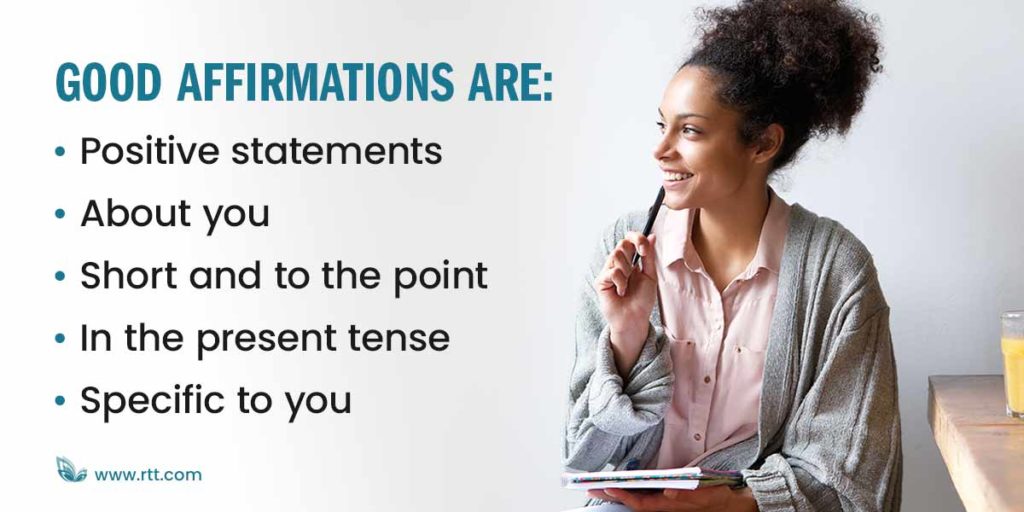
Start with identifying the negative self-talk that you want to change.
Don’t judge those negative thoughts. Simply recognize the negative words you tell yourself and change it to one that is more empowering.
Example thought: “I am NOT as likeable,” “I DON’T know if I can be as smart as everyone else,” “I am NOT good enough.”
Replace with: “I AM lovable,” “I AM capable of doing anything I put my mind to,” “I AM ENOUGH on my own.”
If you practice affirmations, yet for some reason you still don’t feel like they work for you, or your mind is resisting them, consider practicing with the ‘I Am Enough’ Guided Meditation.
If you stick with it and do it once a day for at least 21 days, you’ll be surprised just how easy it is to reprogram your mind.
”Your words and thoughts are powerful and your mind is always listening”—Marisa Peer
Start building your self-confidence through these powerful ‘I Am Enough’ affirmations.
Keep yourself on top of your mental game by reminding yourself that you are enough. Do it throughout your day, even when you’re not practicing affirmations.
One little hack that can help is to write them on small Post-It notes and leave them in places that you regularly visit. If your morning routine starts with you making a cup of coffee in the kitchen, place a little Post-It note next to the kettle with the words “I AM awesome!”
When you read it, say it to yourself out loud five times. It may sound too simple but the more you keep reminding yourself of these new empowering beliefs that you want to adopt, the more it becomes reality.
“Your mind does not care if what you tell it is good, bad, true, false, healthy, unhealthy, right or wrong. It accepts and acts on your words regardless.”—Marisa Peer
Practicing affirmations is the first step to your transformation, however it doesn’t end there.
If you’re finding affirmation a bit of a struggle to get into in the beginning, not to worry.
Marisa Peer is an expert on reprogramming the subconscious mind.
Having helped thousands of people, from CEOs, Olympic athletes, and Hollywood superstars, she developed the award-winning program “I Am Enough.” This program has helped many build an unshakeable confidence and enabled them to live their best life—all through the power of hypnosis.
If you want to experience the power of ‘I Am Enough’ to its fullest, start by signing up for this FREE ‘I Am Enough’ masterclass held by Marisa Peer herself, and get the unwavering confidence to go after what you deserve without doubting yourself.
Once you realize that you are enough, everyone around you will start perceiving you differently.
#2 Embody your affirmation

Did you know that one of the old school aphorisms, “Fake it till you make it,” has some truth to it?
A study by Amy Cuddy, Harvard Business School Exec and Social Psychologist, found that changing our body position and posture can change how other people perceive us and potentially even influence our own body chemistry.
So, what does this tell us, and how can you apply this knowledge?
Affirmations are great; they can help give you a vision of who you want to be and what traits you want to have. However, as powerful as affirmations are, they are no magic pill. To truly take advantage of affirmations you must begin to embody and live what and who you want to be.
Take baby steps. Focus on progress over perfection. Even changing as little as 1% every day can set in motion a domino effect that results in big life changes later.
With every small positive confidence building activity, you cast a vote on the type of person you want to become. Don’t ever underestimate the true power of small changes applied over time.
For example, if you doubt yourself and your abilities to get better grades in college, you can’t just practice affirmations where you repeat to yourself, “I am smart,” and then not bother to study.
You need to do the other half of the work and embody the qualities you want to have.
How to apply it:
You might ask, “How do you embody a quality?”
Simple.
You did badly on a test?
Instead of beating yourself up for your failures, try asking yourself a better question:
“What would a person who does well on a test do?”
Then, try to emulate that behavior from now on until that new trait becomes deeply ingrained in your own self-image.
#3 Reshape your thinking with self-esteem sentence stems

This exercise originates in Nathaniel Branden’s excellent book, ‘The Six Pillars of Self Esteem’.
“Sentence-completion work is a deceptively simple yet uniquely powerful tool for raising self-understanding, self-esteem and personal effectiveness. It rests on the premise that all of us have more knowledge than we normally are aware of—more wisdom than we use, more potential than typically shows up in our behavior. Sentence completion is a tool for accessing and activating these ‘hidden resources.’”—Nathaniel Branden
How to apply it:
Take a sentence stem (for example, “If I bring 5% more confidence to my activities today . . .”) and create six to ten completions of that sentence. The only rule is that each ending needs to create a grammatical sentence.
Write quickly, don’t stop to think, and as Branden advises: “Any ending is fine, just keep going.”
For the next few days, set aside 5-10 minutes to complete the following sentences. Try your best to invent new sentence completions every time instead of repeating the same ones:
- If I bring 5% more confidence to my activities today…
- If I pay 5% more attention to how I deal with people today…
- What if I bring 5% more awareness to my insecurities then…
- If I bring 5% more awareness to my priorities then…
Just by thinking through those hypothetical scenarios, your mind becomes more familiar with how it feels like to be more confident on a daily basis.
This exercise also only asks you for 5% of extra effort from your current baseline. That slow and steady approach compounds over time and before you know it, acting and being confident will become second nature.
#4 Journaling

Many people either go online or write a diary, trying to find answers to disempowering questions such as:
- Why am I so awkward?
- What makes me so shy?
- Why am I so introverted?
The problem with those types of questions is that they keep you trapped in the very same mindset you are trying to get out of.
You are asking about and focusing on your problems, rather than focusing on empowering questions that would help you shift the limiting paradigm you are in.
This is where the next confidence building activity, the habit of asking the right questions and journaling can help you.
By asking the right questions and listening to the answers that come from within, you are able to start conversation with your subconscious mind.
How to apply it:
If you want to journal for improving your confidence, you simply need to ask yourself better questions that leave you with a greater sense of clarity about what confidence means to you.
Take out a journal and ask yourself this in regards to situations where your confidence is low:
- What advice would I give someone else in my exact situation?
- What is the worst possible scenario and how could I live with it?
- How would the best, most confident version of myself behave?
#5 Focus on what you can control

When you want to begin building your self-confidence, it’s important to learn from people that embody that character trait.
One key character trait is that mentally strong and confident people only focus on things they can control and let go of everything else.
That’s why this confidence building activity is: Focus on expression rather than trying to impress other people. Other people’s reactions are not within your control, and trying to please everyone pleases no one.
How to apply it:
Accept that you cannot control it all and focus on your own actions and thoughts, rather than other people’s reactions and perceptions of you. Let go of your need to control and center your awareness on the present moment.
When you’re in a stressful situation, take a deep breath and allow the right words to come to you naturally. Rather than trying to find the perfect thing to say, get outside of your head and focus on what’s in front of you, and see what it does to your confidence.
Final Thoughts On Confidence Building Activities
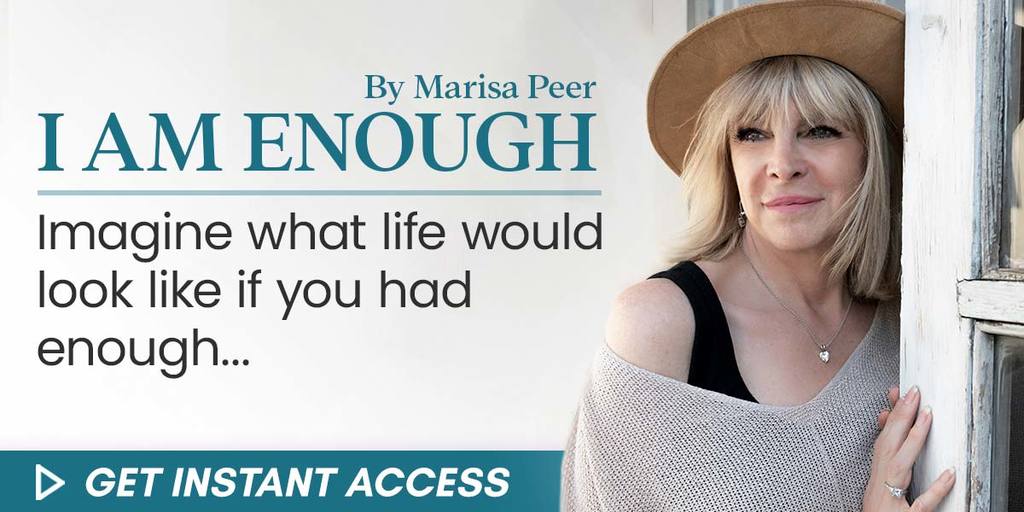
Lack of confidence is not a fixed personality trait.
Confidence is your birthright. It’s been taken away from you through years of unconscious programming that seeped into your mind without you even knowing it.
The good news is that once you realize it, it’s up to you to reclaim that lost power of self-belief and take complete control over your life.
What lies beneath so many of our issues, including self-sabotage, depression, anxiety, addictions, and destructive habits, is a belief that we are not enough. Even people who appear to “have it all” can still feel that they are not enough inside and can go into self-destruct.
I Am Enough
In this free ‘I Am Enough’ masterclass, Marisa helps you uncover the core belief that drives your issues, and helps you reframe it so you can lead a remarkable life.
The skill is in locating why we still hold onto old, outdated beliefs and removing that reasoning, along with the destructive beliefs themselves.
Marisa Peer will help you reprogram your thinking, leaving within you an unshakable certainty and conviction that you are enough and will always be enough.
The 21-Day Unstoppable Confidence Challenge
Marisa Peer understands the impact that low confidence can have on your life. It takes a lot of hard work, perseverance, and time to make an impact on your confidence and improve your thought process, which can be extraordinarily hard to do on your own.
That is why she has created the 21-Day Unstoppable Confidence Challenge. When you sign up to this challenge, you will receive daily trainings over a period of three weeks, along with audios and meditations, all designed to build your confidence skills until they become completely unshakeable and impenetrable. Along with a thriving community of those who have also signed up to do the challenge with you, you will notice transformative changes in your confidence by the end.
Make sure you click the banner below to find out more about the Confidence Challenge, and secure your spot today.
